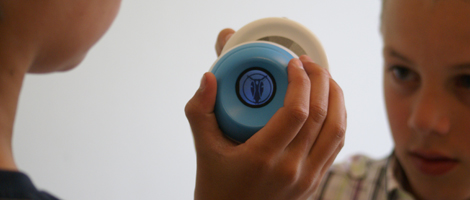Lion or Bear? Self-Tracking and Social Identity
Gary Wolf
August 1, 2008

From [Ethan Zuckerman’s](http://ethanzuckerman.com/) always interesting blog, [My heart’s in Accra](http://www.ethanzuckerman.com/blog/), comes [this story](http://www.ethanzuckerman.com/blog/2008/07/29/social-lions-fiscally-literate-mobile-phones/) of a prototype of a social tracking device that helps teenagers notice patterns in their social behavior – and also alerts their counselors:
Ennea, a project from students at the Eindhoven University of Technology is one of the cooler things I’ve seen in a long time, developed during a six week design class. The students focused on an interesting problem – the problems incoming Dutch high-school students have in building socialization skills. The Dutch education system doesn’t have middle schools, so students go directly from an elementary school to high school, a transition that can be difficult and stressful. Schools assign “tutors” to groups of pupils, and they meet for an hour a week to work on socialization skills. The designers talked with tutors and realized they had very little information about how their students were doing, and designed a fascinating social tool that works as a very clever form of surveillance and behavior tracking.
The designers produced a set of small, cute, wireless-aware objects that students carried with them for a few weeks. The objects measured interactions between children, timing the interactions each child had, and whether they were with individuals or groups. This information allows the designers to describe each child’s interactions in a two-dimensional matrix based on interaction diversity and intensity. (Meet a lot of people and you’re more diverse. Spend a long time with a person, and it’s more intense.)
Rather than scoring the children on good or bad types of interaction, the device characterizes a user as one of nine animals: Lions are very diverse and very intense in their interactions. Their opposites are Polar Bears, who interact infrequently and briefly. Users can change roles over time – the device vibrates when your state changes, but you can only see what role you’ve taken on by “mating” your device with another person’s device, giving the opportunity for conversation and interaction. For “complementary” roles, the animal icons will glow gold.
The idea is similar to an experiment I saw Nathan Eagle describe about last year at ETech: a hundred MIT students were given free use of smart phones in exchange for participating in an experiment that used low power Bluetooth transmissions to track when students were together and for how long. But the twist here makes it much more interesting, for the Ennea designers have created a feedback system designed to make the students’ patterns visible to themselves. They are also being tracked, of course, something that I would certainly have resisted passionately when I was a student. As Ethan points out, the dark spirit of total surveillance haunts technologies like these.
Excise the authorities (we’re allowed to dream), and the game is wonderful. Having the device signal when you change your pattern, and undergo a metamorphosis from one animal to another is brilliant. These moments are hard for us to notice in the near term; often a long time passes before we are able to look back and say: hey, I was changing.


